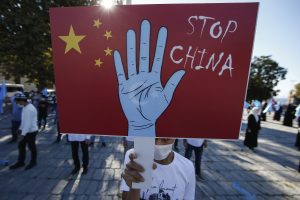Amid the great sense of relief now that the reins of the federal government are in the hands of President Joe Biden, I was distressed to hear his designated secretary of state, Antony Blinken, agreed that China is committing genocide. On the last full day of the previous administration, the Trump State Department released a report arguing that China is committing genocide. When asked if he agreed with this statement, Antony Blinken stated, “That would be my judgment as well…I think we’re very much in agreement.” The report was one of several booby traps that Trump and his loyalists planted in the way of the incoming Biden Administration, because obviously it was not going to be a matter that the Trump Administration would have to deal with. It was issued in order to force Biden to pile still more sanctions on China, or make him seem weak in dealing with a country that is committing genocide, if he does not act.
Former Secretary of State Mike Pompeo’s January 19 statement refers to several egregious human rights abuses, such as discriminating against the Uighurs and forcing them into detention camps, that call for worldwide condemnation. Pompeo’s press release states that Chinese “authorities have conducted forced sterilizations and abortions on Uyghur women, coerced them to marry non-Uyghurs, and separated Uyghur children from their families.” Such a policy would take several decades to lead to biological extinction of the group. Moreover, these policies are subject to change. After all, the one-child policy, to which the Chinese people were subjected, was only officially ended in 2015.
True, this was not the first time the Trump Administration tried to inflame valid criticisms of China. The administration consistently sought to make Chinese human rights abuses sound equivalent to those of the Nazis. Accordingly, Trump officials frequently used the term “concentration camp” to refer to the internment camps holding up to a million Uighurs. Elbridge Colby, who is reported to have formed the Trump Administration’s China policy during his service as Deputy Assistant Secretary of Defense, was asked recently why he chose this term to refer to the internment camps. He responded, “I’m using them in a sense that say the British used them in the turn of the century …. That they are concentration camps where people are interned and some of them are killed as far as we know, so I don’t think we should underestimate what’s going on there.” Regrettably, Antony Blinken employed the same term, stating, the Chinese are engaging in the “forcing of men, women and children into concentration camps.” Blinken is Jewish; his stepfather is a Holocaust survivor. He should know better. Concertation camps, I know as a Jew who escaped Germany in 1935 and lost most of his extended families in these camps, engage in systematic killing of millions of people.
To reiterate, human right abuses against the Uighurs should be condemned, as are those carried out by U.S. allies, for instance India’s recent massive abuses of Muslims. However, the Uighurs will exit the detention camps alive, and many will actually keep their beliefs and continue to support the resistance to the authoritarian regime.
I was saddened to hear Blinken so readily agreeing that China was committing genocide, before the Biden Administration had a chance to develop its China policy. I worked with Blinken briefly when we both helped then-Senator Joe Biden develop a more communitarian policy, urging the U.S. to stop imposing a highly centralized government on Iraq and to favor instead one in which each province would get a high measure of autonomy, allowing Kurds, Arabs, and Sunnis more self-government. I was very impressed with his command of the issues and his level-headed approach. I hope the pressure of seeking confirmation just momentarily led him to misspeak.
Other key members of the incoming Biden Administration struck a rather different note. When Avril Haines, the Director of National Intelligence, was questioned during her confirmation hearing, she took a much more balanced approach. She stated that “China is adversarial and an adversary on some issues, and in other issues, we try to cooperate with them, whether in the context of climate change or other things. And ultimately, the frame that the president elect has identified for thinking about this is as a global competitor.” John Kerry, former Secretary of State and current Special Presidential Envoy for Climate, is reported to be very keen to collaborate with China.
The U.S. will have to find ways to combine strong criticisms of China’s human rights abuses with efforts to work with China to curb the pandemic, increase international trade, create and enforce new rules on conduct in cyberspace and outer space, and avoid wars. Using inflammatory language will not help any of these causes.
Perhaps there is hope. Just as this article was going to press, President Joe Biden’s nominee for UN Ambassador Linda Thomas-Greenfield said the State Department was reviewing its designation of China’s treatment of Uighurs and other minority groups in the Xinjiang as “genocide.”
Amitai Etzioni is a professor of international affairs at The George Washington University. He is the author of several books, including Avoiding War with China. Please visit his new platform for discussion, CivilDialogues.org.

































